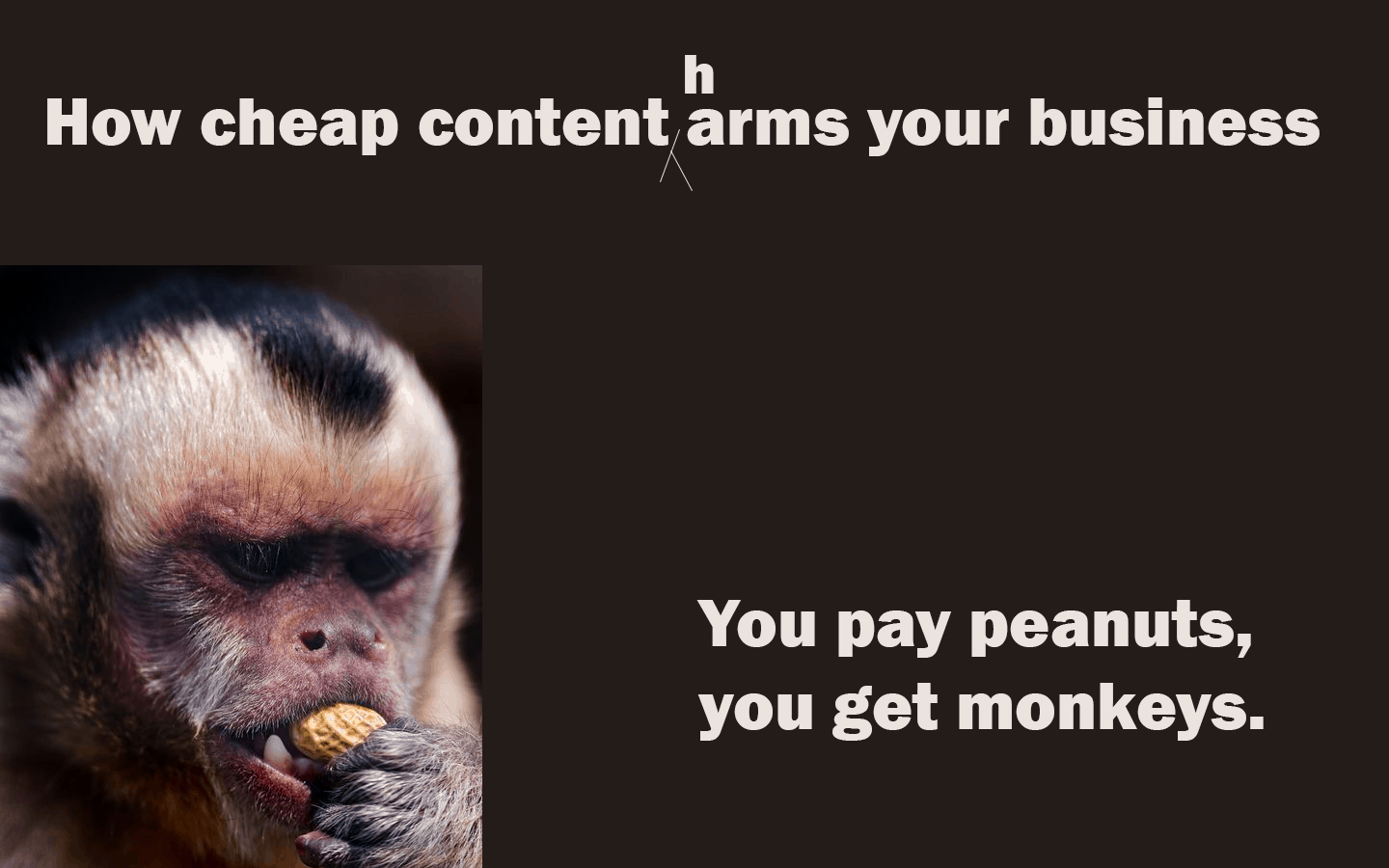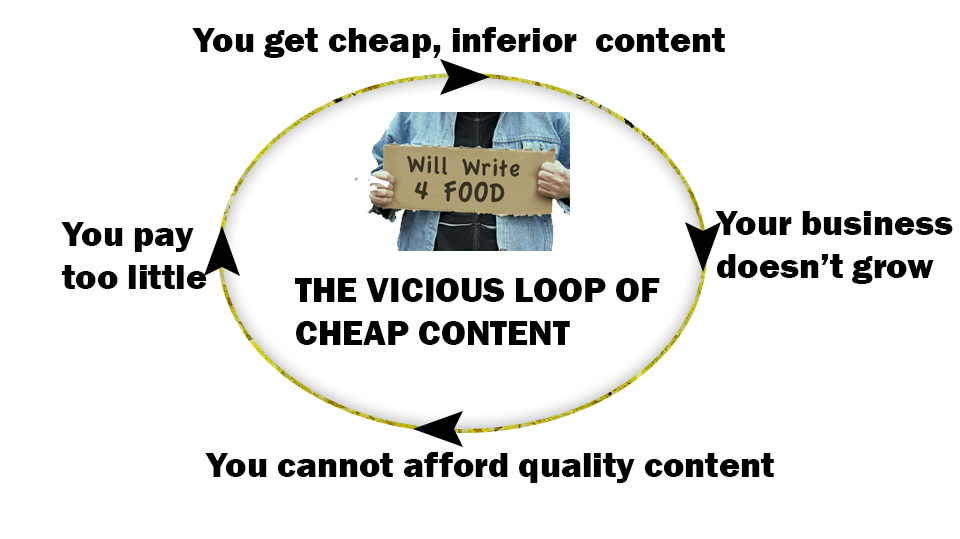
Cheap content harms your business
Just stumbled upon this blog post titled “pay peanuts, get monkeys” that basically means if you publish cheap content on your business website your conversion rate falls down drastically.
I would like to state at the outset that I have been offering low-cost content writing services from my website (although, I’m gradually toning down) and I was mostly outsourcing this work to writers who can produce lots of “passable” content at extremely low rates. I would also like to tell you that I started providing low-cost content after having provided content writing services at normal international rates for more than 4 years (I still do) primarily because of 2 reasons:
- There is high demand for cheap content
- Writers are actually willing to provide such content
So I thought if there is a demand and if there is a supply and if I can earn money out of it then why not? I started offering a “package” and I also got some clients and some steady work for my writers. I mostly provide this content for SEO boost — it helps my clients increase their keyword density. But it stops there.
Cheap content is a vicious loop of failure

Vicious loop of cheap content
The problem comes when some of the clients want very cheap content and then want to use this content as their primary content and when the quality doesn’t meet their expectations they complain.
It’s like, desiring to drive a car while paying for a cheap bicycle.
This is exactly where the expression “pay peanuts, get monkeys” applies.
Cheap content isn’t always bad and surprisingly there are a few writers who really write well without charging much.
How do they do that?
When I asked around for most of them writing is just a side activity carried out either during office hours or after office hours.
They have the skill but they don’t have the expertise and providing professional content writing and online copywriting service is not their primary activity.
This means they neither invest in resources nor in improving their skills.
They are simply comfortable with the language, they can quickly search on the Internet and find the relevant information and then rewrite it very fast.
Nothing is unique and individual voice is always lacking.
This is where the clients pay the casualty.
Whereas cheap content written around your keywords can certainly give you an SEO boost it doesn’t help you when it actually comes to selling.
You may increase your search engine traffic but it will just remain traffic; you’re going to generate very little revenue.
This is because your inferior content is never going to convince them into doing business with you.
Your content needs to inculcate a sense of trust and authority.
If you sound like a teenager it isn’t going to do you much good if your target market mostly consists of grown-ups who are very conscious about making purchase-decisions.
Content writing is like any other service: it takes effort and experience to give you content that gets you business.
There is a reason why bigger businesses eagerly pay hundreds and even thousands of dollars to experienced copywriters and content writers; they perfectly know what harm cheap content can cause.
But I hear some of you saying, “What makes you think that people who charge less cannot provide quality content?”
I have a Chinese Blackberry phone that almost looks like the real thing.
So if you can purchase really cheap versions of a Blackberry or an iPhone, why do you spend so much money on the real devices?
Well, this may seem rhetorical so let us see the practical aspect.
Let us say a content writer agrees to charge you just $5 for a business webpage — a professional content writer may charge you anywhere between $40-$100 for the same webpage, and I’m not talking about a well-known and reputed content writer or copywriter.
How much time do you want your content writer to spend on your particular webpage?
One hour? Two hours?
Keep in mind that your business depends on this page and that is why you are getting it written.
When people read it they will make their purchase decision.
So you would like your content writer to spend ample amount of time while preparing your page.
You would want him or her to properly understand your business and your market and you would also want him or her to visit your competitors’ websites to check out how they express themselves.
To sound convincing you would want your content writer to properly understand your concept and its impact on the target audience.
After all this, you would want him or her to come up with convincing copy.
Do you actually want someone working on your business page who is desperate enough to provide a skill for just $5 per hour or worse $2.5 per hour?
How much time can that person actually devote to your content?
He or she will certainly devise ways to make up for the meager payment.
On the other hand if you pay standard rates (rates that enable your content writer to make contemporary income per hour) then you make sure that your content writer eagerly spends sufficient time on your project without having to worry about how to make up.
He or she doesn’t have to come up with “n” number of words in the given time.
He or she can actually focus on the quality of your content.
So what is the solution if you don’t have a big budget?
Quality always works better than quantity.
Well-written 10 articles are far better than poorly-written 100 articles.
The same goes for your web pages. If you don’t have budget for 20 pages just stick to 10 pages but get some writer who can really write them well.
And what if you also need SEO content?
Then you need to strike up a balance.
You can publish low-quality content in as much quantity as possible but also make provisions for well-written content that actually does business for you.
You need to balance between content that generates you search engine traffic and content that converts that traffic into paying customers and clients.


